Life after Guillain Barre Syndrome: From paralysis to walking again
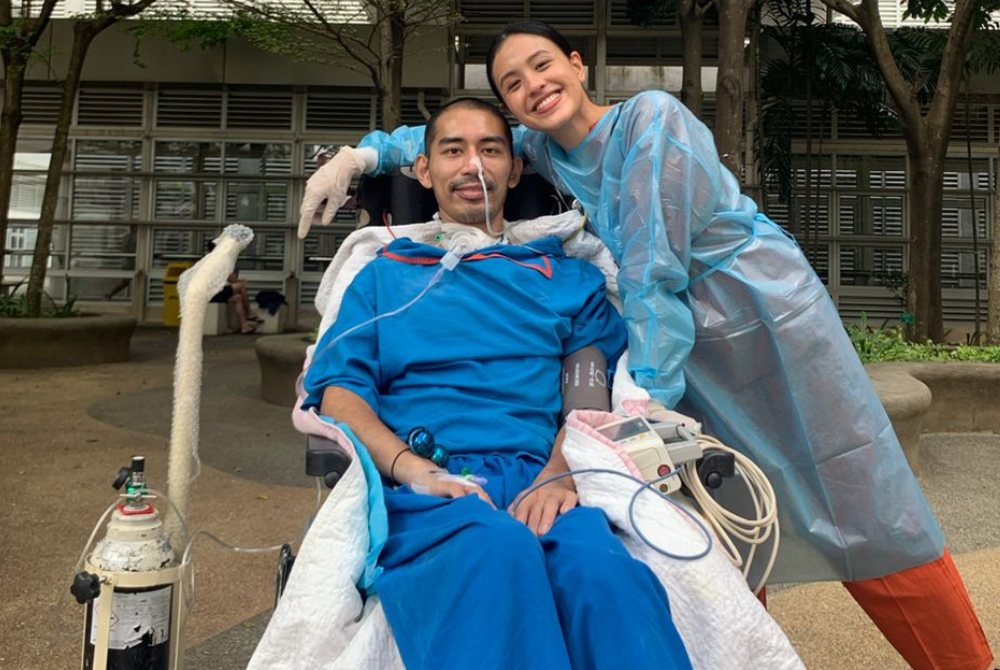
Life is full of surprises. Sometimes, these surprises can alter the course of your life.
May 2022 marked the beginning of what would appear to be the most challenging months ahead for Luqman Yahya, 37, and his wife, Aishah Afifah Aziz, 31.
It all started amid the Raya Aidilfitri holidays. One fateful Saturday, Luqman woke up feeling slight numbness around his fingers and toes.
He shrugged it off, thinking it was nothing serious, and proceeded with his normal daily routine. However, on Sunday, the numbness did not subside. In fact, he felt that it crept up to his whole body.
He questioned whether it was due to insufficient rest, or if it was an anxiety attack he was experiencing. But Monday came, and things got worse.
“I could hardly lift my limbs but I was adamant to go to work. I consulted a friend who is a doctor and he explained that my symptoms were synonymous with an anxiety attack.
“But he also suggested for me to seek help from a neurologist as it could possibly be related to my nerves,” said Luqman in a video call.
That Monday, Luqman said he managed to drive himself home from work, but the symptoms continued to regress.
“I couldn’t walk up the stairs, I couldn’t even change my clothes. Taking off your trousers, for example, requires balance and I couldn’t balance myself to do that,” he said.
A visit to the neurologist at a private hospital then set the pathway for what was to come. Luqman, who didn’t respond to any reflex test and appeared fragile raised some concerns.
“The doctor said I think you have this thing called GBS, or Guillain Barre Syndrome, which was something I’ve never heard of before,” he said.
According to Healthline, Guillain-Barre Syndrome is a rare but serious autoimmune disorder where the immune system attacks the healthy nerve cells in the peripheral nervous system (PNS).
“Based on the google definition, we only saw two words - rare and paralysis. Complete paralysis for that matter,” he said.
Overwhelmed by the news, both Luqman and Afifah tried to make sense of their situation.
He was then admitted immediately and began treatment right away.
GBS is typically triggered by an infectious illness, such as gastroenteritis or even a lung infection.
However, Luqman did not go through an episode of a bad case of an infectious illness, other than experiencing mild Covid a month before, during Ramadan.
For this, doctors weren’t able to pinpoint what exactly triggered GBS for Luqman.
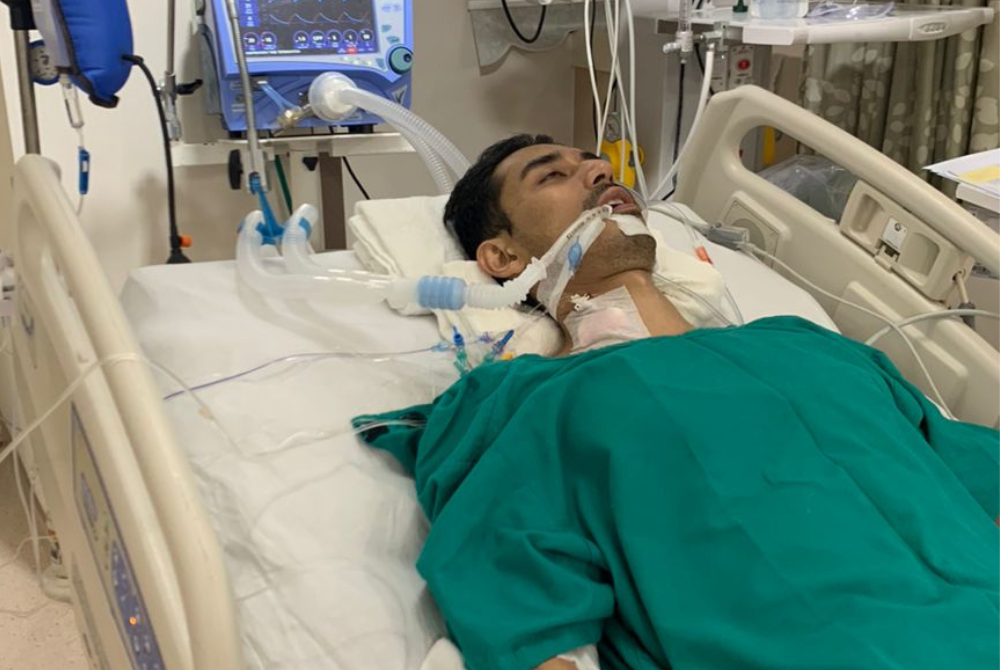
WAITING GAME
The treatment, called Intravenous Immunoglobulin Therapy helps people with weakened immune systems or other diseases fight off infections.
Essentially, the treatment combines immunoglobulins made from plasma donated by others to treat various conditions. Intravenous means that the plasma is administered by a drip.
However, the effect of this treatment is not immediate. It may take a few weeks before the patient shows improvement, so it doesn’t work like antibiotics whereby the patient will typically recover within a few days.
From that point on, it was a waiting game. Upon completing the first round of treatment in the span of five days, doctors waited another week before wanting to try another course of action.
However, while waiting, Luqman’s condition deteriorated quickly, to the point where he had to be intubated.
Afifah shared that the day after Luqman was intubated, the doctor had opted to try another treatment. With GBS, there are only two treatment modalities; IVIG or plasma exchange, explained Afifah.
Plasma exchange is like dialysis where they will filter out the damaged antibody and replace it with new plasma fluid.
“But even with this, Luqman experienced so many complications. For example, the blood flow wasn’t right, and he had blood clots too,” said Afifah.
Things just continuously deteriorated from there. “My physical ability was impacted, my lungs collapsed so I couldn't breathe on my own. It attacked every muscle group in my body.
“The thing with GBS is that it’s a waiting game. You have to wait until the attack has peaked before you see the first sign of recovery. From then it will progressively get better,” said Luqman.
But the wait was long. At the peak of the GBS attack, Luqman shared that his bowel system was hay wired, and he was even partially blind as his eye muscle was also affected.
He also experienced vocal cords paralysis, where he was unable to control the movement of the muscles that control the amount of fluid and saliva that goes into the body.
When this happens, the liquids can unnecessarily slip into the trachea and lungs, causing further complications.
Along with the internal complications, his body also showed external complications whereby his skin began to deteriorate, his fingernails weren’t growing evenly, and he had bed sores from being bedridden.
With so many tubes attached to his body, that could eventually trigger more infections.
At that point, they weren’t sure of when the first sign of recovery would happen.
“Doctors told us to be patient, as it may take three to six months or even more. It was very uncertain,” said Afifah.
After going through multiple complications, Luqman was then transferred to University Malaya Medical Centre (Pusat Perubatan Universiti Malaya) and this was when it was a game changer.
Doctors had assured Luqman his case was manageable and that he can eventually recover, but it was just a matter of time.
Still, while waiting for the first sign of recovery, Luqman experienced multiple complications.
THE FIRST SIGN
After being in the hospital for months, Afifah shared that in August, Luqman showed his first sign of recovery.
The first sign was that Luqman could flap his arms. Over time, he could perform limited movements, which doctors were happy to see.
“The was encouraging but I was still feeling down having been bedridden for so long,” he said.
Afifah said he lost a lot of weight too. Pre-illness, Luqman weighed 73kg, and at the peak of his attack, he weighed 42kg.
Because he had lost so much weight, his bones started poking through his skin.
“It was tough. As simple as feeling an itch, I couldn’t scratch myself. All those things we typically take for granted, I couldn’t do it.
“At one point, I couldn’t even speak because I had facial paralysis so we had to come up with new ways to communicate,” he said.
But slowly after he showed his first sign of recovery, things progressed steadily.
When doctors decided he was well enough to be transferred out of the ICU unit, he was then moved to a rehab ward and this is where he went through intensive occupational therapy sessions.
“I was brought to the gym twice, and that’s when my recovery was exponential. The idea was to see signs of recovery while my nerves were regenerating.
“But of course, the road to recovery wasn’t easy. It was a painful experience having to retrain my muscles,” added Luqman.
September onwards, Luqman continued with therapy and learned to do more things independently like button his shirt and tie a shoelace, for example.
“It was a humbling experience to relearn everything,” he said.
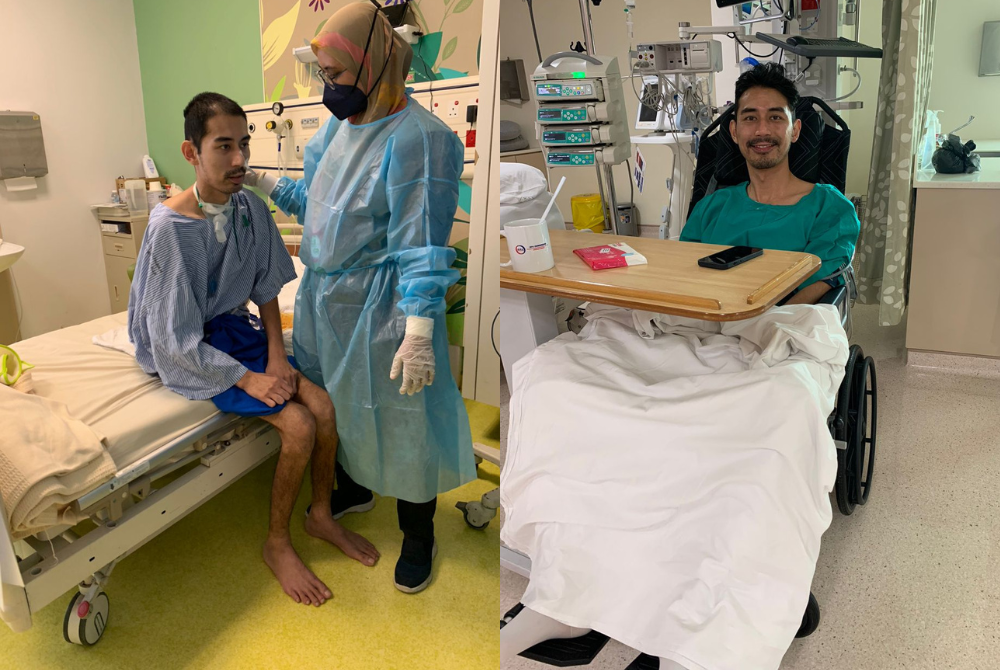
ROCK BOTTOM
Throughout this journey, it’s understandable for Luqman to experience mental breakdowns.
“When I couldn’t talk or see, it was just me and God. “For someone who is typically mentally and physically strong, I felt that this "test" of mine was so demoralising.
“I told God that I wanted to die. It sounds harsh but it was too painful not just physically but mentally.
“I often asked the doctor for painkillers or morphine so that I could sleep it off. I told them, please just let me sleep until all of this goes away.
“But that wasn’t possible because having so many drugs in your body would cause complications,” he said.
A WIFE’S PERSPECTIVE
For Afifah, watching her husband go through such a life-shattering experience, was traumatic for her in the beginning.
“It was so bad. My previously fit and handsome husband collapsed in mere days and had to be in diapers. It brought so many emotions,” she said.
Luqman and Afifah, who tied the knot in November 2019, share a daughter, named Salma. At the time when Luqman was diagnosed with GBS, Salma was only about six months old.
Juggling motherhood and having to care for her husband was no doubt a challenge, but thankfully she had a strong support system as both of their families lived nearby.
“Going through it, I had many private conversations with God. I listened to Mufti Menk and Yasmin Mogahed just to get myself in the right state of mind.
“I told myself that this is what I am tested with, this test has been specially designed for me.
“I’m sure my husband was going through a lot as well, but as the immediate family member that has to deal with it, I had to prepare myself for this journey,” she said.
Afifah, who is a dentist by profession, took a sabbatical leave to focus on her family.
“There were so many layers to this dugaan (test). I didn’t know what I was doing, but I took things one day at a time. It was a learning curve.
“The doctors were giving me a timeline, and I was just not comfortable hearing it. But I knew that I needed to.
“I dared not to think too far ahead, it was too scary. If I did that, I would’ve probably gotten an anxiety attack.
“I knew that the problem was big, but I needed to dissect and focus on one problem at a time. I think with that approach, I was able to handle it quite well,” she said.
As for Luqman, what upset him was not being able to perform his role as the leader of his family.
“My wife had to assume the mental load and look after our baby as well.
“But the support that she gave me was crucial. I’m lucky to have a wife who would do anything to ensure that not just me but my baby was well attended to.
“She kept moving forward and that gave me the confidence to soldier on.
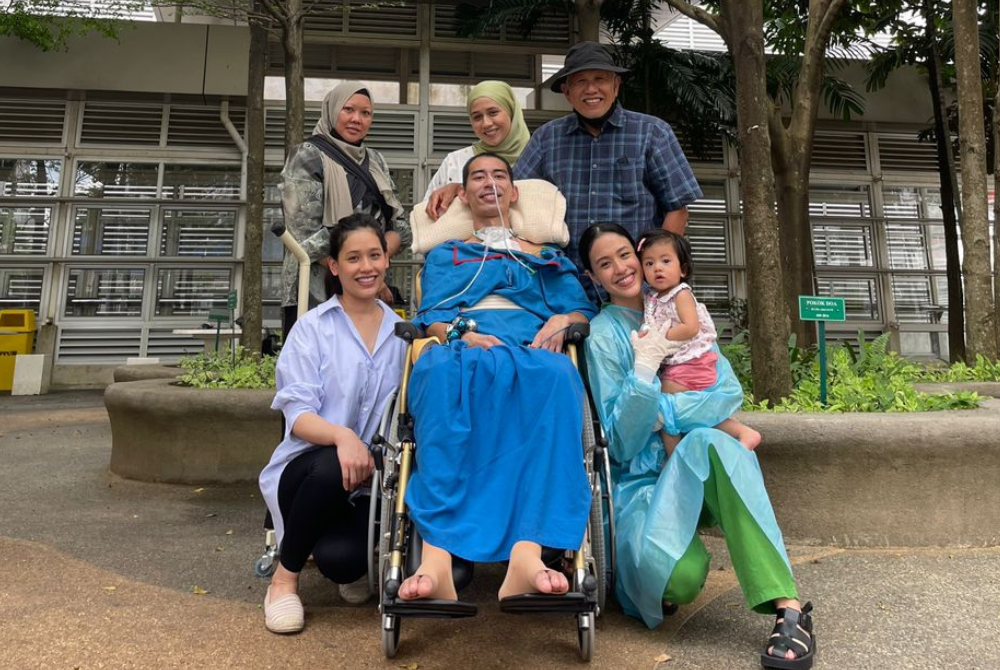
BACK AT HOME
Luqman was finally discharged on the first week of October.
“The doctors didn’t want to prematurely discharge me but I said six months is enough.
“I just wanted to be at home, I wanted to see my wife and be with my baby. I felt that there would be more motivation for me at home to recover. True enough, the recovery has been well and good.
“Right now, I still feel some throbbing sensation. I was warned that while my nerves regenerate, I will experience a lot of tingling feeling so it tends to be hyper-sensitive.
“While my nerves are regenerating, the numbness has not completely subsided. I still feel numbness in my hands and feet.
“I’m just telling myself that it won’t go away completely. But at least I can now independently manage myself.
“Things that were hard for me to do like brush my teeth, I can do them now,” he said.
Luqman, who works in the banking industry, shared that it has been a little over a month since he returned to work and that he now continues with his physiotherapy sessions and exercises.
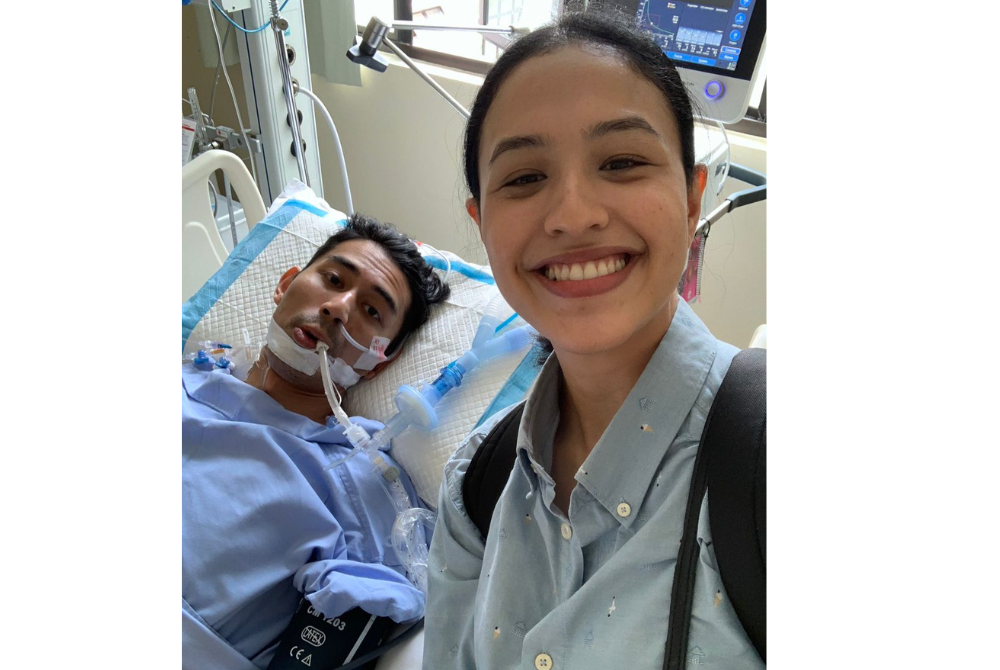
AN EXPERIENCE THAT BRINGS A SMILE
Before this happened, Luqman said his priorities were his job and earning more money.
If there’s anything that this life experience has taught him, is that nothing is more important than family.
“I would be too focused on my career growth and I put my family second, but now I realise there’s more to life than work.
“When I was sick, my family was there for me. My wife was at the forefront, managing everything,” he said.
Afifah said that going into marriage, both husband and wife would need to be mentally prepared as things may not always be roses and butterflies.
”Your relationship as a couple will be tested during these trials.
“Early on when I got married, I told myself that I am prepared for what was to come. I will protect my family, and do whatever I can physically, financially, mentally - I’m all in,” said Afifah who shared that she went through something similar previously, having taken care of her ill mother who passed away in 2010.
“In hindsight, I’m grateful for this experience. It’s a very humbling experience but I am happy with how it turned out and the lessons we both learned.
“When I think about it, it brings a smile to my face. Of course, it was difficult but it was an achievement and I am proud of how I achieved it.
“Now, he is home, he can spend time with our daughter. He is having dinner with me, so I’m just so grateful,” she said.















